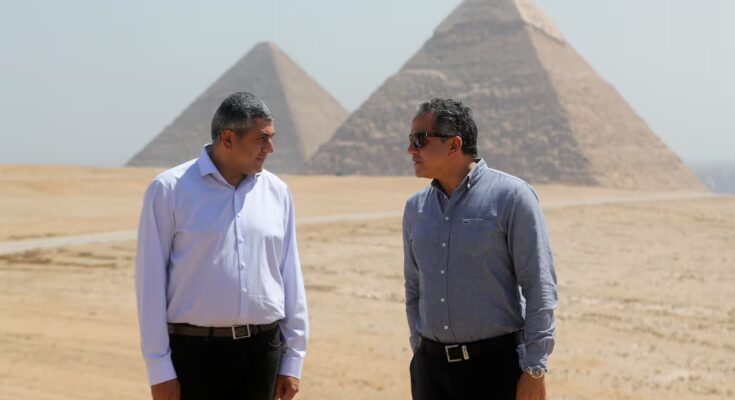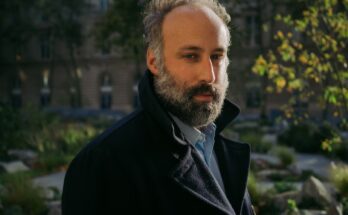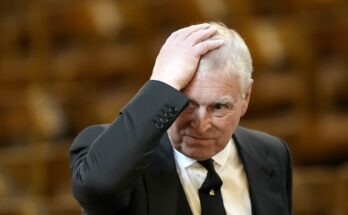The famous Egyptologist Khaled al Anani (Giza, 54 years old) ended this Thursday a career that took him from his first steps as a tour guide in his native Egypt to the director-general of the United Nations Educational, Scientific and Cultural Organization (UNESCO). In a vote in which he obtained practically unanimity – 172 out of 174 countries voted for him, two against and one abstained – the UNESCO States confirmed him as the new director general of that United Nations agency during the 43rd meeting of the General Conference, held in Samarkand (Uzbekistan).
Al Anani, who succeeds the French Audrey Azoulay, is the first Arab and the second African – after the Senegalese Amadou Mahtar Mbow, who held the position between 1974 and 1987 – to lead UNESCO in its 80 years of history. His election was taken for granted, given that a month ago he was proposed for the position by the Executive Council and the General Conference, where all member states sit. But even so, his near-unanimous nomination is as surprising as his career, since the Egyptologist is a candidate from outside the organization.
Al Anani began his career in culture from scratch. In his youth, in the early 1990s, he was a tour guide in Cairo and his native Giza. At the same time, he laid the foundation for a solid academic career, which led him to train several generations of students as a professor at the public Egyptian University of Helwan. He has also been a visiting professor in France on several occasions, as well as having obtained a doctorate in Egyptology from the Paul-Valéry Montpellier 3 University (France) in 2001. As a cultural manager, his roles as director of the National Museum of Egyptian Civilization (2014-2016) and the Egyptian Museum in Cairo (2015-2016) stand out.
Author of more than twenty specialized publications and numerous conferences in more than 15 countries, he has combined teaching, public management and scientific research over the last three decades. His leap into politics came when he was appointed Minister of Antiquities in 2016, a position he expanded in 2019, also taking on the Tourism portfolio.
At the helm of this reunited Ministry, he spearheaded large-scale projects such as the development of the National Museum of Egyptian Civilization and the Grand Egyptian Museum, scheduled to officially open on November 1.
Under his mandate, events of great international media coverage also took place, such as the Golden Parade of the Royal Mummies in Cairo and the reopening of the Avenue of the Sphinxes in Luxor. With them, Egypt has strengthened its cultural and tourism image in the world, as well as promoted more than fifty heritage restoration works across the country. In 2024 he was appointed Special Ambassador for Cultural Tourism by the United Nations Tourism Board and Patron of the African World Heritage Fund.
Al Anani is fluent in Arabic, French and English and has made international cooperation one of the pillars of his career. Among his priorities he highlighted inclusion, access to heritage for children, the elderly and people with disabilities and raising awareness among young people through educational programs in museums and sites.
His candidacy for director general of UNESCO was submitted by Egypt in 2023 and had the official support of the African Union and the Arab League. Several states, including Spain, had publicly expressed their support.
After the results were announced in Samarkand, Al Anani expressed his gratitude and promised to “serve humanity in all its diversity,” beyond “any regional or cultural affiliation.”
“United,” he said, “by the same aspiration to live with dignity, build a better future and let peace prevail. Everywhere I went, in classrooms, in laboratories, in heritage sites, in cities, I saw the same belief. The belief that education can heal, that science can guide, that culture can connect, and that communication can unite humanity.”
For this reason, continued Al Anani, today’s world “needs a strong and united UNESCO”. As director of UNESCO, the Egyptologist said that much of his priorities will focus on the budget, at a time of difficulties due to the withdrawal of the United States from the organization from the end of 2026, given that that country contributes 8% of the total funding of the agency.
His only rival in this race was Congolese Firmin Edouard Matoko, whom the former Egyptian minister had defeated by an overwhelming majority (55 votes to 2) in the vote held by secret ballot by the Executive Council on October 6 in Paris. Mexican Gabriela Ramos Patiño, deputy director general of UNESCO’s Humanities and Social Sciences, was also initially a candidate, but she withdrew her candidacy this summer.



